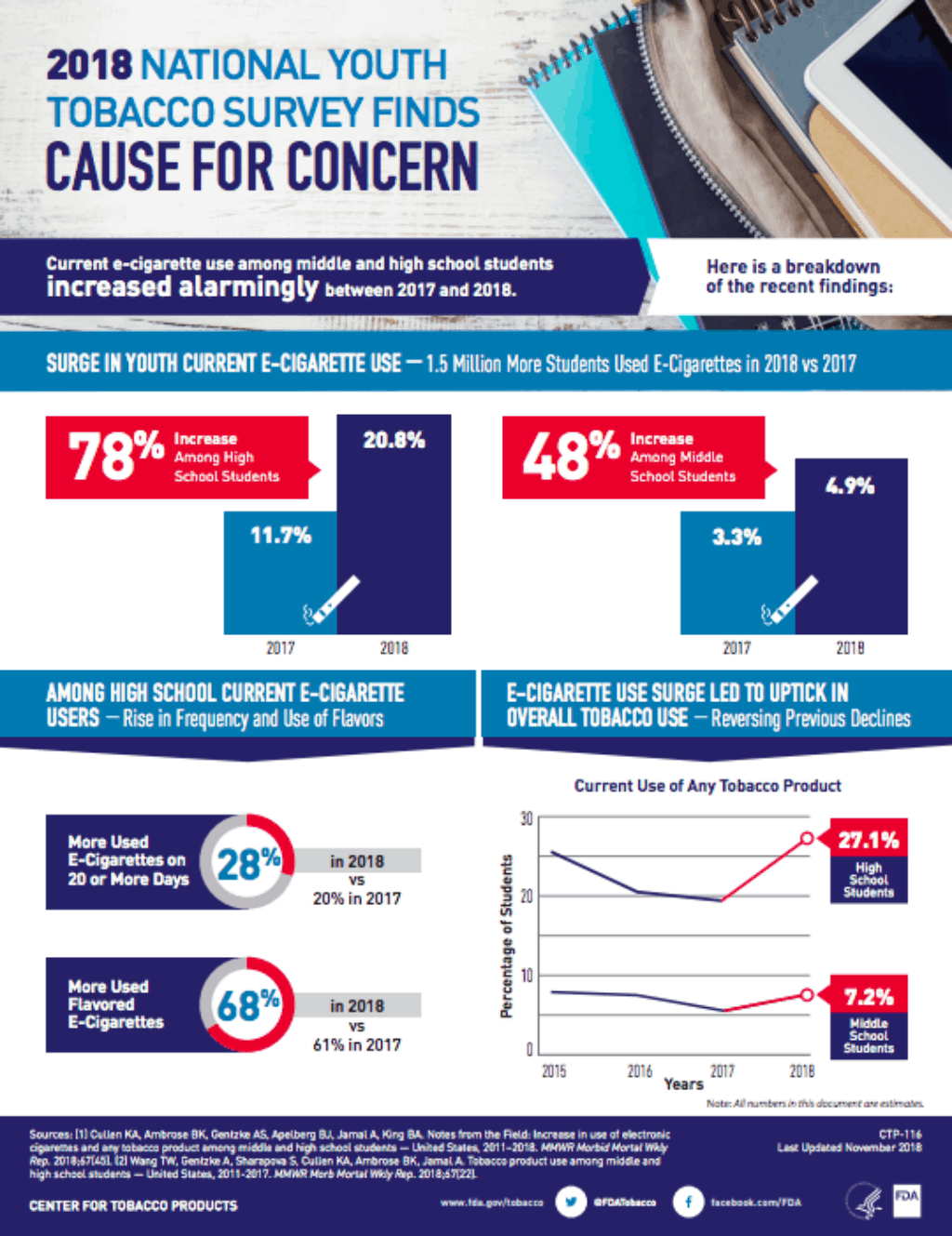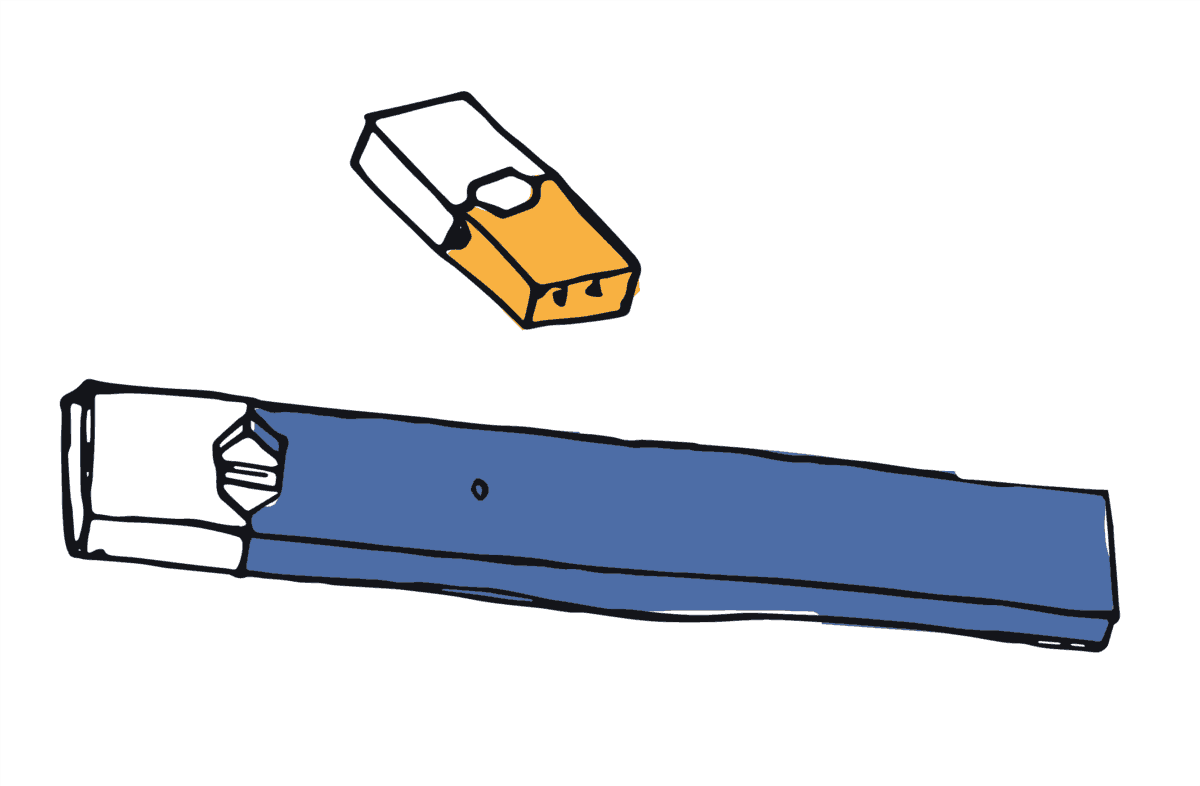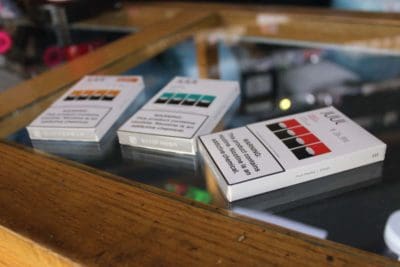On Oct. 15, 2018, North Carolina Attorney General Josh Stein submitted a civil investigative demand to Juul Labs “for more information about Juul’s marketing practices, retailers, contact with resellers, efforts to verify age before purchase, and any youth education and awareness programs.”
“We’ve had ongoing conversations,” Stein said. “They’ve been producing documents that we’ve requested on a rolling basis and continue to, so the investigation proceeds.”
The investigation follows similar moves by other states, like Massachusetts, that are taking a deep look at how effective e-cigarette companies are at preventing their products from getting into the hands of minors.
Most notably, the Food and Drug Administration (FDA) launched a crackdown on the industry in April after learning through the 2018 National Youth Tobacco Survey that 1.5 million more students used e-cigarettes in 2018 than in 2017. The survey, carried out by the FDA and the Centers for Disease Control and Prevention (CDC), highlighted a dramatic surge in youth e-cig use, with 78 percent more high schoolers and 48 percent more middle schoolers vaping this year than last.
“It’s incredibly stark, dramatic, and scary,” Stein said of the rates of youth e-cigarette use. “I want people to understand how this has mushroomed at just an incredibly fast rate. If you had a high school senior three years ago and you have a middle schooler now, the world has completely changed in the last three years.”


The FDA’s investigation of Juul made headlines again in October when it announced it had raided Juul’s offices and seized thousands of documents related to the company’s marketing practices. The agency then gave a 60-day deadline for plans limiting teen access to products for five e-cigarette makers: Juul Labs (for Juul), R. J. Reynolds Vapor Co. (for Vuse), Altria Group (for Mark Ten), Imperial Brands (for Blu), and Japan Tobacco (for Logic).
However, the FDA’s requests — for revisions to marketing practices, ending distribution to retailers selling to minors, and discontinued sale of popular flavored e-cig products — fell largely on Juul. That’s because Juul has the majority of the market share in the e-cig industry, estimated at about 76 percent, according to recent Nielsen data.
“By comparison, for the most recent period, blu eCigs is at 6.3 percent, MarkTen is at 4.3 percent and Logic at 2.3 percent,” reporter Richard Craven wrote in the Winston-Salem Journal.
In response to requested regulations, Juul Labs released a comprehensive action plan last month. The action plan includes measures to:
- stop “accepting retail orders for our Mango, Fruit, Creme, and Cucumber JUUL pods to the over 90,000 retail stores that sell our product, including traditional tobacco retailers (e.g., convenience stores) and specialty vape shops”
- adding “additional age-verification measures to an already industry-leading online sales system that is restricted to people 21+ and utilizes third party verification”
- preventing bulk shipments of online orders to “two devices and fifteen JUUL pod packages per month, and no more than ten devices per year”
- adding a secret shopper program to ensure retail compliance
- stopping unauthorized online sales
- shutting down Facebook and Instagram and using YouTube “for posting testimonials of former adult smokers who have switched to the JUUL system”
- new age-verification technologies for online and retail sales
Juul Labs also released a 3 percent nicotine version of its Juul pods, lower than its usual 5 percent nicotine cartridges.
When I asked a smoke shop employee, who I interviewed for our science of Juuling article, how the regulations have impacted Juul customers visiting the store, he responded, “It hasn’t phased Juul people at all.”
And as regulations in the U.S. are enforced, Juul, with its $16 billion valuation, also has its eyes on the international market, including Canada, Israel, the U.K., and Indonesia to expand its mission as a smoking-cessation product globally.
The ever-growing issue of young people vaping, however, hits closer to home — even for Attorney General Stein.
“[The investigation] was prompted from the fact that I have high schoolers, and I see their friends, and I see when I go to the school for activities — Juuls are everywhere,” Stein said. “And you see children vaping. If you walk in the parking lot, it’s littered with the little flavor pods.”
“This is an instance where we need, the government needs, to help protect kids and that’s by holding companies accountable for how they do business,” Stein added. “And what I need to determine is whether Juul intentionally tried to get its product seeded throughout our nation’s high schools and middle schools.”
Stein views regulation of nicotine-based vape products like Juul not only as a way to stem more young people from getting addicted to nicotine at a young age, but also from using other drugs in the future.
“There’s a relationship between getting addicted to anything as a high schooler and future addiction into adulthood,” Stein said. “The vast majority of people addicted to substances as adults were addicted to something else as a teenager.”
“So once you’ve trained your brain, the neural pathways to need a chemical, to become addicted … you’re also going to be more likely to become an alcoholic or become addicted to opioids or cocaine or methamphetamines or some other drug that can have incredibly devastating effects,” Stein added.
Stein also said he thinks Juul should be aware of how their product may already be misused by young people.
“The pods are not supposed to be refillable, they’re supposed to be disposable,” he said. “But all you have to do is go online and you can see a video and if you have a toothpick and pair of tweezers, you can fill the pod with any kind of chemical, and that’s gravely concerning.”
This concern of students vaping other substances (in any vape device) has become a reality for schools across the state, and while many teachers shared stories of incidents of students vaping other drugs in our recent teacher survey on e-cigarette use, most wanted to remain anonymous for the sake of student confidentiality or for the sake of simply not making their school look bad.
But after an incident in Cabarrus County Schools where 14 students were rushed to the hospital after vaping synthetic products, the district openly stepped up to enforce consequences.
“In Cabarrus County, any possession of vapes or vape pods or vape juice, which is the liquid that goes into a vape, is considered drug paraphernalia,” said Amanda Macon, assistant principal of Jay M. Robinson High School in Concord. Macon said the disciplinary decision came after police told her they had evidence some of the vape liquids confiscated were laced with heroin and methamphetamines.
This disciplinary action differs from other districts who treat vapes —often nicotine-based — as tobacco products, which are also prohibited on school’s tobacco-free campuses.
“Because we have no way to test it, then everything is disciplined as if it were drugs and drug paraphernalia,” Macon said, referring to the incidents in the county where students became seriously ill or unconscious by vaping laced synthetic cannabinoids.
Cabarrus County Schools’ approach means that students with vapes or vape products receive an automatic 10-day suspension and have to take a drug education class with a parent before being able to return to school.
Just the day before I spoke to Macon on the phone, she had a student suspended for vape possession.
“His mom came in and said, ‘We found that he was doing this, and we told him he had to stop, and obviously he didn’t,'” Macon said, noting that awareness among parents and students has grown because the district made the consequences very clear “both in writing and verbally in assemblies, and on our website, and in our handbook, and in the Cabarrus County handbook.”


As a result of the district’s crackdown, Macon has upwards of 30 confiscated vapes in her desk drawer.
“I started taking pictures and sending them out to my network because they all look different,” said Macon, whose team has worked to educate fellow administrators and school nurses through continued professional development on the issue of vaping. But since last fall, she has recognized that new products are harder to catch than the older ones.
“The little Juuls, they don’t make much of a noise,” she said. “They’re hard to catch unless somebody rats somebody out.”
The district continues disciplinary action on student vaping and remains partners with the Concord Police Department and the Cabarrus County Police Department. Macon said it’s also helpful that every school in the district has a school nurse.
“I want the general public just to understand that vapes are one of those things just like any other product that’s not allowed on a school campus,” Macon said. “It becomes a distraction to the school environment and that’s why these consequences are so severe.”
“Part of our jobs as educators is to help students make good decisions about their personal health, and this is not one based on research that is a good health choice for them. It’s also not legal for students who are under the age of 18,” she added.
But do these types of regulatory measures by schools have any impact on student behavior?
“I have two students who each received a few days out of school for vaping,” a teacher from Gaston County said, following up from our teacher survey. “They knew vaping was against school rules and still decided to use them in the boy’s room.”
So I spoke to one tenth grader in Cumberland County to learn more about why students might choose to vape despite the consequences. He started Juuling about six months ago, and for the sake of his anonymity, we’ll call him Chase.
“One of my friends, he got caught the other day actually,” Chase said. His friend received a three-day, out-of-school suspension. Other students, though, he said have figured out a way to avoid the consequences.
“The kids are outsmarting the teachers,” he said, explaining that if students are caught they may hand off a vape on the way to the office to someone else that’s not going to get caught, or simply hide it somewhere.
Students go to the office to get searched without the vape on them. “Then when they don’t find anything they just go back … pick it up, and go back to class,” he said.
Kids working to outsmart the system didn’t quite stand out to me, but something else he said did.
I asked him how many of his friends still bring vapes with them to school.
“I know only like three people that have a Juul that don’t bring it to school,” he said. “But then I know like 50 people that have one and bring it to school.”
Then I asked him why he thought they felt the need to bring their Juuls with them, knowing the consequences.
“I’m going to say they’re most likely addicted,” he said.
Tomorrow, we wrap our Juul series with a look at student vaping and public health.
Editor’s Note: One week after the publication of this article, it was announced that Altria “will buy a 35 percent stake in Juul Labs Inc for $12.8 billion.” While this article reported that Juul’s valuation was $16 billion, it is now valued at $38 billion. More on this development here.



